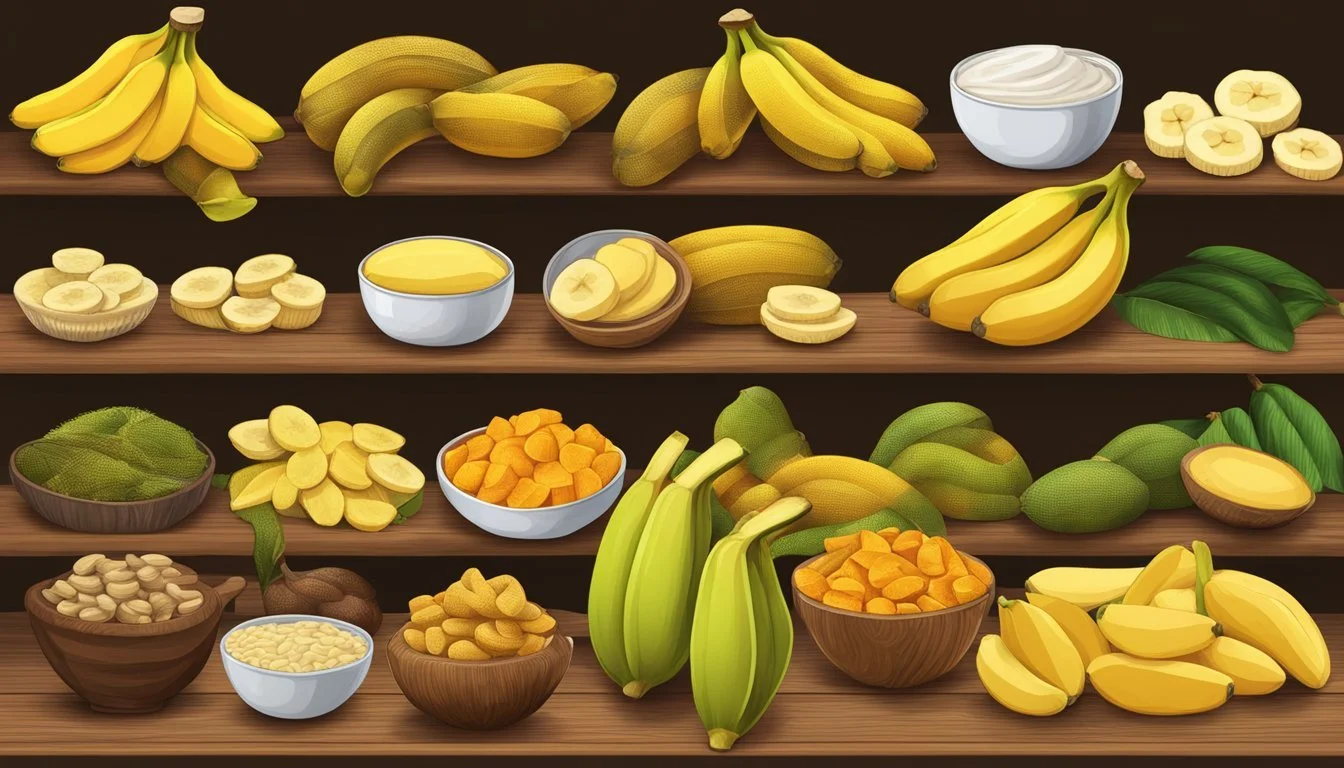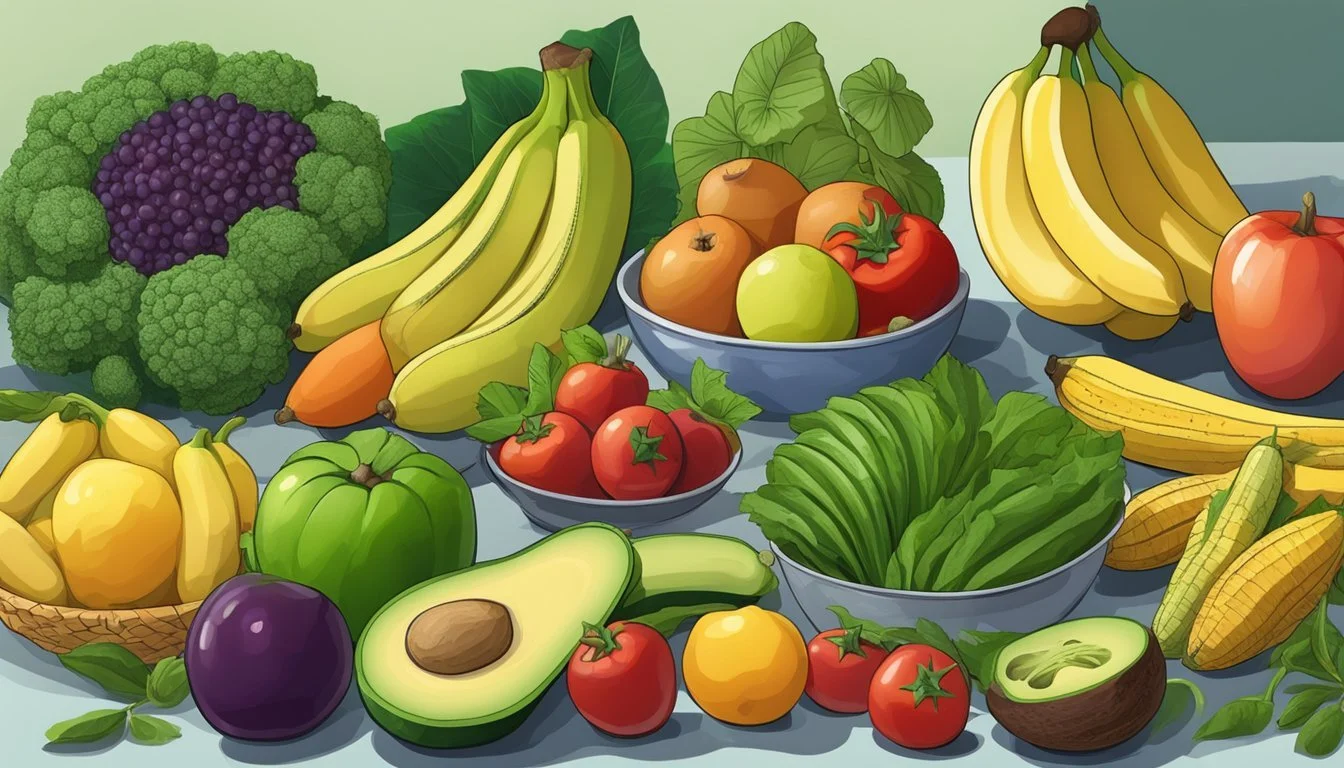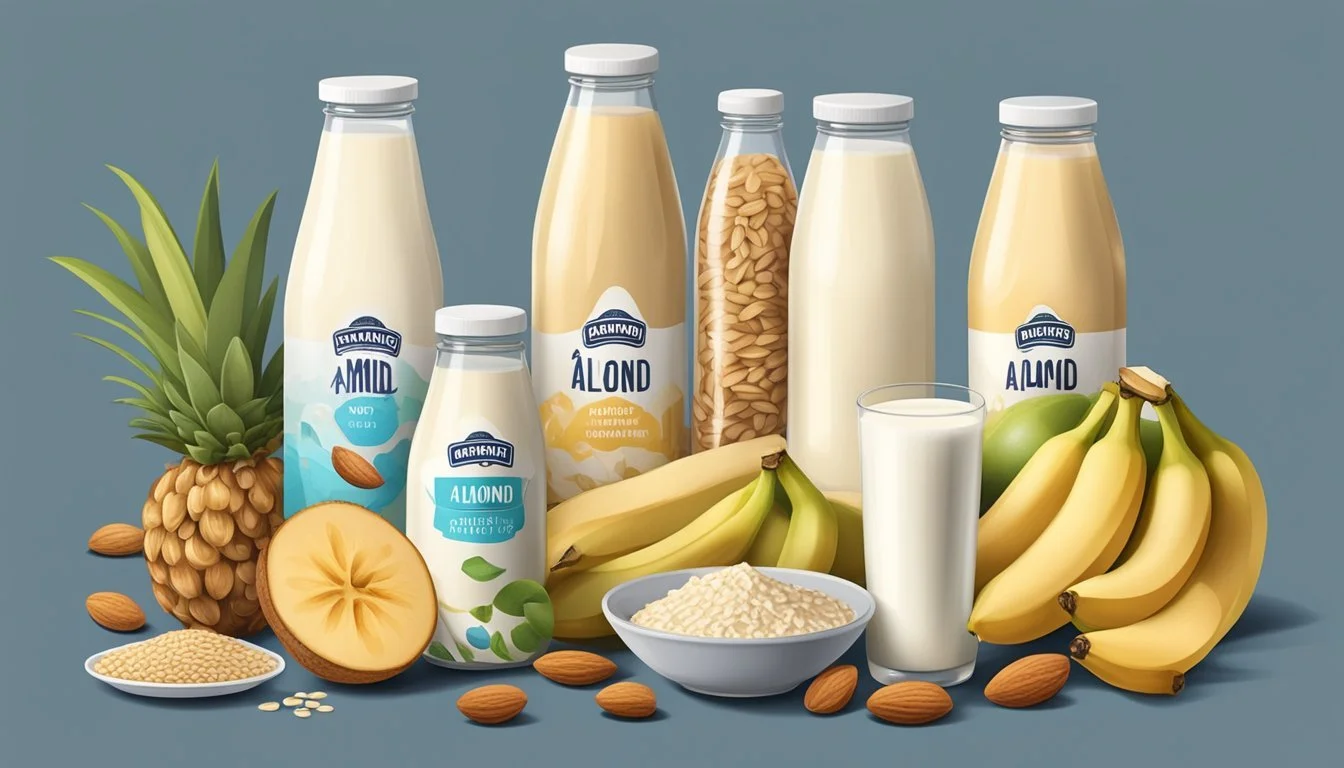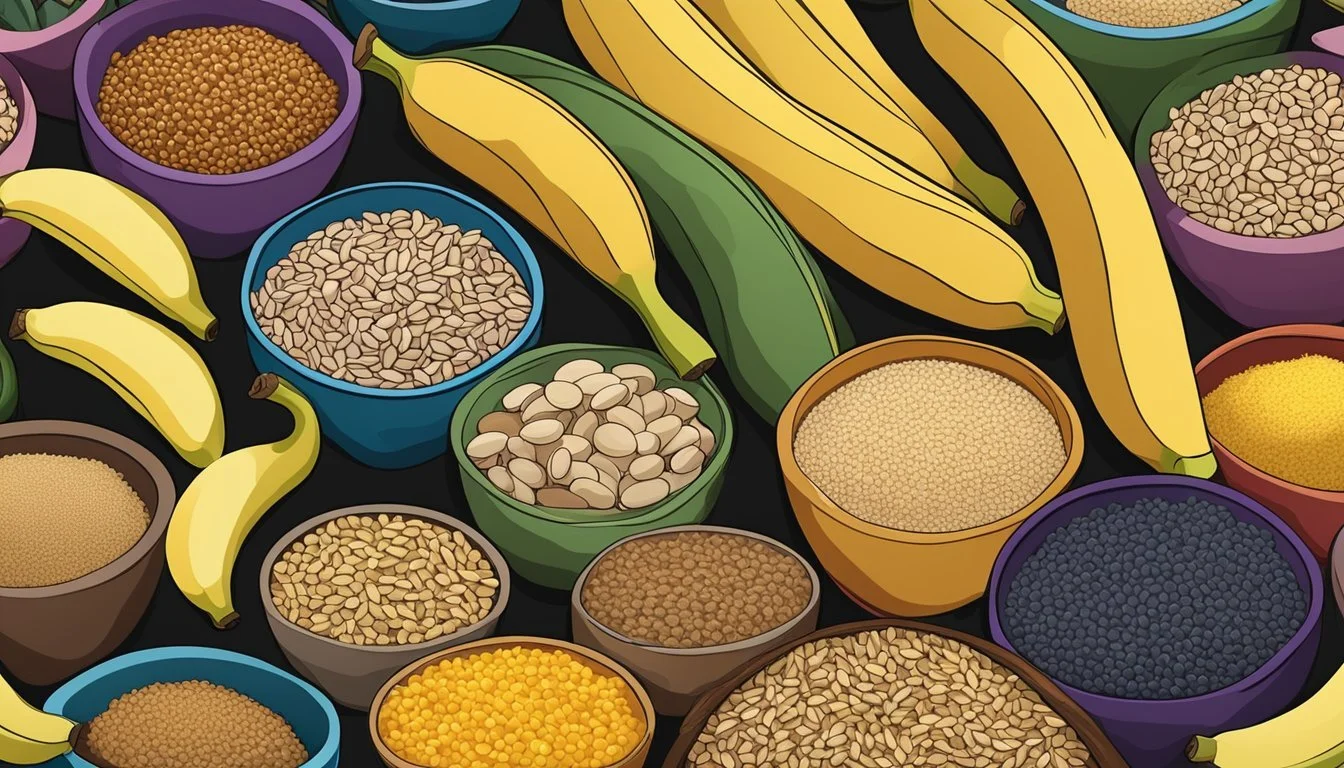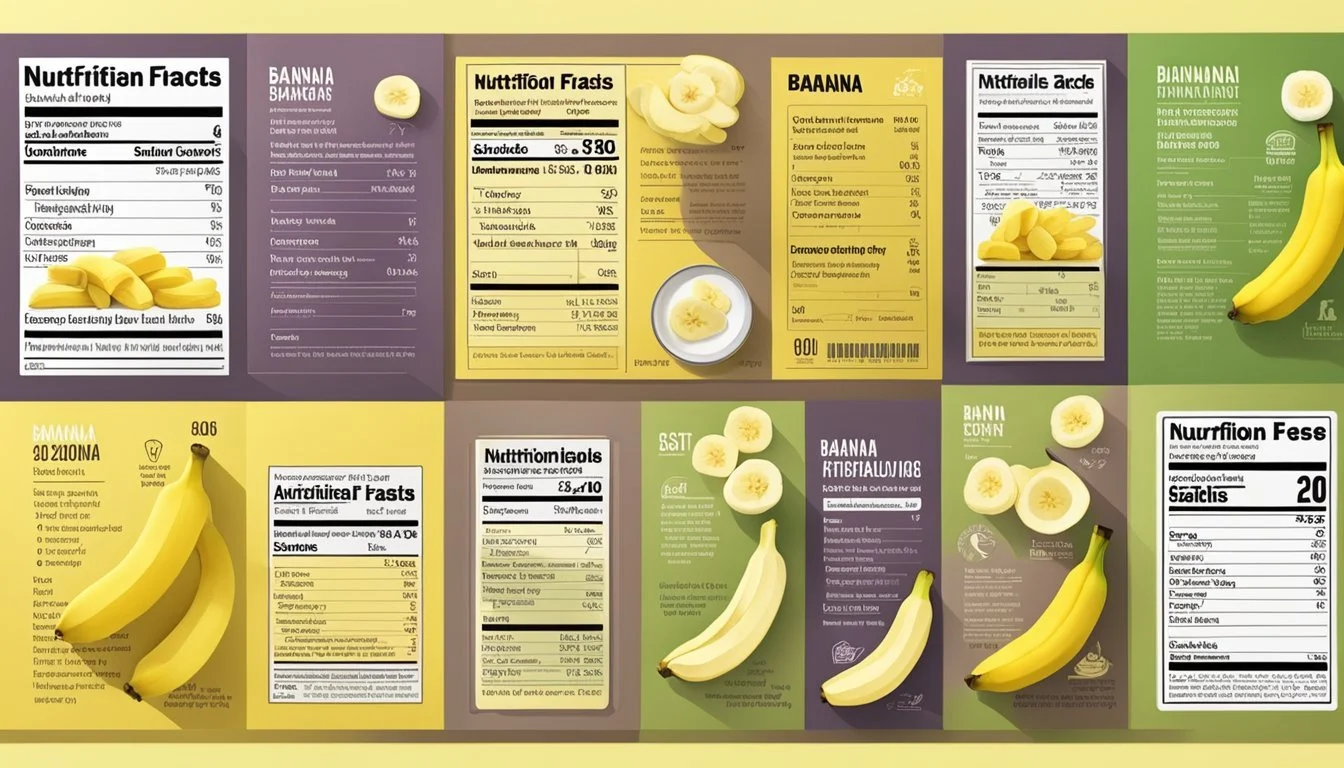Banana Substitutes
Top Alternatives for Your Recipes
Bananas are a staple in many diets, offering a blend of sweetness and nutrition that makes them a popular choice for snacks and use in various recipes. They are known for their natural sugars, potassium content, and soft, creamy texture, which contribute to their versatility in cooking and baking. However, there are situations when one might need an alternative to bananas, whether due to dietary restrictions, allergies, or simply a shortage of bananas at the local grocery store.
In these instances, a variety of banana substitutes can provide similar flavors, textures, or nutritional benefits. Some of the most effective replacements include apple sauce, which can offer moisture and a subtle fruit flavor to dishes. Sweet potatoes (What wine goes well with potatoes?), with their natural sweetness and dense texture, can also mimic bananas in certain recipes. Others might choose plantains, avocado, or even oatmeal and yogurt to replicate the desired aspect of bananas in their culinary creations. Each substitution offers unique characteristics that can cater to different cooking needs, ensuring that the absence of bananas does not limit one's ability to enjoy their favorite recipes.
Exploring Banana Substitutes
In the culinary world, bananas are a staple due to their texture and moisture content. However, when they are unavailable, or a different flavor profile is desired, various substitutes can be effectively utilized in baking and cooking.
Role in Recipes
Bananas are often used in recipes for their unique combination of sweetness, moisture, and binding properties. They are particularly essential in certain baked goods, where they contribute to the overall texture, and can provide a natural sweetness that reduces the need for added sugars. However, when looking for alternatives, substitutes must be chosen that provide similar benefits. For instance, applesauce can be used to deliver comparable moisture, while eggs can offer the necessary binding in baking recipes. The smooth texture of avocado makes it an excellent banana substitute in smoothies and desserts. Here are standard substitutes with their suggested ratios:
Substitute Measurement Suitable for Chia Seeds Gel 1 tablespoon of chia seeds + 3 tablespoons of water Baking, Binding Applesauce Use in equal measurement to the banana Baking, Moisture Pumpkin Puree Use in equal measurement to the banana Baking, Moisture Sweet Potato Pureed, in equal measurement to the banana Baking, Texture, Sweetness Greek Yogurt Use in equal measurement to the banana Smoothies, Creaminess Avocado Mashed, use in equal measurement to the banana Smoothies, Desserts
Moving Beyond Bananas
The desire to move beyond bananas in recipes can arise from dietary restrictions, flavor preferences, or nutritional goals. Avocados, for example, can add healthful fats and a creamy texture. When substituting for bananas, it is vital to consider the purpose the banana serves in the recipe—whether it is for moisture, sweetness, or structure. A substitute like pumpkin puree can provide a similar texture and moisture to baked goods, with a mild, sweet flavor. It's critical to adjust the recipe's other ingredients accordingly to achieve the desired final product. For those looking to emulate banana flavor without the texture or carbs, banana extract is a strong alternative, using a few drops as needed. If one desires to maintain a certain amount of sweetness but reduce the moisture content, dried banana chips can be added to recipes, typically as a garnish.
Fruit-Based Banana Substitutes
When seeking banana substitutes in recipes, particularly for smoothies and baked goods, fruit-based options like applesauce and pureed fruits offer similar textures and can contribute to the desired sweetness and moisture content.
Applesauce in Detail
Applesauce serves as a versatile stand-in for bananas in many recipes. A half cup of unsweetened applesauce can typically replace one banana, especially useful in baking items such as muffins and desserts. Unsweetened applesauce has the advantage of maintaining the sweetness of the dish without overpowering it with additional sugar. Its mild flavor makes applesauce a seamless substitute, blending well with other ingredients.
Other Fruity Alternatives
Aside from applesauce, other fruits offer various flavors and sweetness levels for replacement in recipes. Mango, known for its subtle sweetness and thick texture, excels as a banana substitute in smoothies. Pureed dates provide rich sweetness, ideal for sweet dishes and often preferred for natural sugar enhancement. When selecting alternatives, one should consider the moisture content and flavor profile of the fruit to ensure compatibility with the recipe at hand. Here is a summary of fruit-based alternatives to bananas:
Applesauce (unsweetened): ideal for baking, providing moisture without extra sugar.
Mango: suitable for smoothies, adding a creamy texture and mild sweetness.
Dates: best used pureed for an intense, natural sweetness in desserts.
By considering these fruit-based options, one can successfully replace bananas while maintaining the integrity and taste of the dish.
Vegetable-Based Options
When seeking to replace bananas in various dishes, vegetables such as pumpkin and sweet potatoes offer a nutritious alternative that can match the necessary texture and sweetness.
Pumpkin and Sweet Potatoes
Pumpkin: In recipes, pumpkin can replicate the moisture and sweetness that bananas provide. One can utilize pumpkin puree in breads or muffins to achieve a similar dense, moist texture. Pumpkin also blends well into smoothies, offering a flavor profile appropriate for autumn-inspired drinks. Additionally, one could opt for canned pumpkin as a convenient substitute, especially when the subtle squash-like flavor of pumpkin is preferred.
Smoothie: Use 1/4 cup of pumpkin puree to replace one banana.
Bread: Substitute equal amounts of pumpkin puree for mashed banana in recipes.
Sweet Potatoes: Sweet potatoes’ natural sweetness and starchiness make them an excellent stand-in for bananas, especially in baked goods. They help retain moisture in breads and can contribute to the desired consistency in smoothies. Sweet potatoes can be steamed or boiled and then mashed to replace bananas. When using mashed sweet potatoes, they not only mimic the sweetness but also provide a nutritious boost.
Smoothie: Start with 1/2 cup mashed sweet potato for one banana.
Recipes: Incorporate mashed sweet potatoes in a 1:1 ratio for banana in various recipes.
Dairy and Non-Dairy Alternatives
When seeking substitutes for bananas to achieve a creamy texture and rich flavor in recipes, a variety of dairy and non-dairy options offer a range of proteins, healthy fats, and consistencies suitable for vegan and dairy-free diets.
Greek Yogurt and Regular Yogurt
Greek Yogurt: It is a versatile substitute known for its creamy texture and high protein content. Greek yogurt can add richness to smoothies and baked goods.
Regular Yogurt: With a lighter consistency than Greek yogurt, regular yogurt still provides a creamy texture. It can be used to soften the overall texture of vegan recipes without overpowering other ingredients.
Avocado and Coconut Products
Avocado: This fruit is celebrated for its healthy fats and ability to impart a creamy consistency. Avocado is an excellent banana alternative in smoothies and dessert recipes where its mild flavor doesn't conflict with the desired outcome.
Coconut Products:
Coconut Milk: A dairy-free alternative that provides a creamy texture and a subtle coconut flavor, suitable for both sweet and savory dishes.
Coconut Cream: This is thicker than coconut milk and can be used in recipes requiring a richer, denser consistency.
Tofu and Cashews
Tofu (specifically silken tofu): Silken tofu blends smoothly into recipes, offering a creamy texture without a dominant taste, making it a smart choice for dairy-free and vegan desserts.
Cashews: When soaked and pureed, cashews create a rich, neutral-flavored cream perfect for sauces and spreads. They are a valuable component in dairy-free cooking as they provide a luscious smoothness to dishes.
Grains and Seeds as Alternatives
When considering banana substitutes, especially in baking and various recipes, grains and seeds stand out as nutrient-dense options that also contribute to texture and dietary fiber content.
Oats and Oatmeal
Oats provide a valuable alternative to bananas due to their texture and composition. Rich in fiber, which is crucial for digestive health, they contribute a chewy consistency and can absorb moisture, making them suitable for baking applications. In recipes such as pancakes or smoothies where bananas would typically act as a binding agent, oatmeal can serve as an excellent substitute. They offer additional benefits including:
Calories: Oats contain fewer calories than bananas, creating a lower calorie option for those monitoring their intake.
Fiber: The high dietary fiber content in oats promotes satiety and may help with weight management.
Chia Seeds
Chia seeds are another substitute that should not be overlooked. These tiny seeds are virtually flavorless, making them an extremely versatile addition to a plethora of dishes. When soaked, chia seeds develop a gel-like texture, similar to what one might expect from mashed bananas in puddings or certain baked goods. Their benefits include:
Fiber: They are a terrific source of fiber, aiding in digestion and providing a feeling of fullness.
Calories: The caloric content of chia seeds is relatively low, considering the nutritional punch they pack.
By incorporating oats or chia seeds into baking and other recipes, individuals can enhance the nutritional profile and fiber content while adhering to dietary preferences and needs.
Nutritional Aspects of Substitutes
When looking for banana substitutes, one should consider the macro- and micronutrient profiles, caloric and fat content, and mineral composition to ensure they align with dietary needs and health goals.
Macro- and Micronutrients
Banana substitutes such as plantains, applesauce, and sweet potatoes offer varied nutritional profiles. Plantains are close relatives to bananas, also rich in complex carbohydrates and fiber, but they contain less sugar. Applesauce, a gluten-free alternative, can provide vitamin C and fiber with fewer calories. Pureed sweet potatoes are nutrient-dense, offering fiber, vitamin A, and an array of micronutrients.
Comparing Calories and Fats
Switching from bananas to certain substitutes can reduce calorie and fat intakes. For example:
1 cup mashed bananas: 200 kcal, 0.7 g fat
1/2 cup applesauce (as a substitute for one banana): fewer calories and virtually no fat
Avocado can act as a substitute in smoothies, providing healthy fats and a creamy texture.
Minerals in Substitutes
Different substitutes can enhance certain minerals in the diet. Sweet potatoes are a source of manganese and copper, while eggs, if used as a binding substitute in baking, offer iron and vitamins. Plantains and avocados furnish the body with potassium, though one might choose applesauce or pureed fruits for a low-potassium diet.
Culinary Uses and Considerations
When substituting bananas in culinary applications, a chef should consider how the alternative affects texture and consistency, flavor profiles, and its suitability for different recipes. The chosen substitute should complement the dish's essence while fulfilling the functional role of bananas.
Texture and Consistency Crafting
To achieve a texture comparable to bananas, one can use coconut cream at a 1:1 ratio for mashed banana. It provides a creamy consistency that is particularly useful in smoothies and puddings. Silken tofu, with its smooth texture, can serve as an effective moistening agent in breads and muffins.
Applesauce: Use 1/2 cup to replace one banana for a similar texture and to add moisture to baking recipes—careful not to exceed 1 cup as it may make the batter too wet.
Sweet potatoes: Offer a creamy texture when mashed and bring a natural sweetness to dishes, which can be utilized in various baking scenarios.
Maintaining Flavor Profiles
Flavor is paramount in culinary applications, and ingredients should be selected that either closely mimic or complement the flavor profile of bananas. For a mild flavor, applesauce and sweet potatoes can be used since they also bring sweetness, reducing the need for additional sweeteners. Greek yogurt adds a pleasant tanginess in addition to creaminess, working well in quick breads and cakes.
Pureed beans: A less conventional option, providing a mild nutty flavor and can enhance baked goods without overpowering other flavors.
Applications in Different Recipes
Different recipes may warrant specific substitutes based on their role in the dish. Whether it is for binding, moisture, or sweetness, each alternative has unique properties suitable for certain culinary applications.
Banana in Baking: Appropriate substitutes include applesauce, silken tofu, and Greek yogurt, particularly to maintain moisture and act as binding agents in cakes and quick breads.
Banana as a Sweetener: Both applesauce and sweet potatoes can act as natural sweeteners, which can be beneficial in muffins and puddings.
Banana for Creaminess: Coconut cream can impart a creamy texture in smoothies, and Greek yogurt can enhance the richness of sauces or dressings.
Practical Tips for Substitution
When substituting bananas in baking, it's crucial to consider how the replacement will affect both the consistency and the taste of the final product. Precise measurements and thoughtful adjustments can help maintain the integrity of the recipe.
Amounts and Ratios
Applesauce: To replace one banana, one can use a 1/2 cup of applesauce. It imparts moisture and natural sweetness.
Silken Tofu: This can be used in a 1:1 ratio for mashed banana for a smooth texture and its ability to bind ingredients.
Greek Yogurt: Use 1/2 cup of Greek yogurt to replace one banana for added moisture and a creamy texture.
Sweet Potatoes: They can be mashed and measured in a 1:1 ratio for banana to add creaminess and sweetness.
Coconut Cream: It's a suitable substitute when used in a 1:1 ratio for mashed banana, or 1/2 cup to replace one medium banana.
Egg Whites: They should be used judiciously, as they can add a fluffy texture. Generally, two egg whites can replace one banana in recipes requiring a light, airy consistency, such as protein bars.
Oatmeal: While not a direct substitute, oatmeal can be used for its binding properties, especially in recipes where bananas are used for this purpose.
Texture and Baking Adjustments
To maintain the desired texture:
With applesauce, one may need to reduce other liquids in the recipe, as it adds additional moisture.
Silken tofu requires thorough blending to achieve a smooth consistency, ensuring no lumps remain.
When using Greek yogurt or coconut cream, one might need to adjust sugar levels in the recipe, as these substitutes can alter the sweetness.
Substituting with sweet potatoes could require extra mixing time to achieve the required creamy texture.
For substitutions that lack the natural binding ability of bananas, such as oatmeal, adding a little bit more of a binding agent like eggs or flaxseed might be necessary.
When egg whites are used, it's important to not overmix the batter to keep the incorporated air, which contributes to the fluffiness of the bake.
Common Questions Answered
Discovering the variety of substitutes available for bananas in recipes can be a game-changer for those with allergies, dietary restrictions, or simply a lack of bananas on hand. This section aims to clear up the most common queries surrounding the topic of banana substitutes.
Substitutions FAQ
What can replace bananas in baking for texture?
Applesauce and sweet potatoes are excellent replacements that provide moisture and a subtly sweet flavor.
Oats can also serve as binders in baked goods to mimic the density provided by bananas.
Are there substitutes that mimic the flavor of bananas?
Plantains and avocados closely match the taste profile of bananas, with the added benefit of similar textural properties.
What is a good dairy-free alternative to bananas in creamy dishes?
Coconut cream offers a rich, vegan-friendly option that contributes a similar creaminess to dishes without the dairy.
For health-conscious baking, what are the best banana substitutes?
Greek yogurt and silken tofu provide protein and a creamy consistency with fewer calories.
Pumpkin puree is another nutritious alternative offering moisture with a gentle sweetness.
Can I use other fruits as banana substitutes in smoothies?
Avocados can deliver the creaminess you're looking for in smoothies without altering the nutritional content drastically.
By addressing these frequently asked questions, one can confidently alter recipes that typically call for bananas without compromising on taste or texture.

